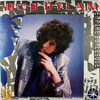BOB DYLAN : EMPIRE BURLESQUE
- Tight Connection to My Heart (Has Anybody Seen My Love)
- Seeing the Real You at Last
- I'll Remember You
- Clean Cut Kid
- Never Gonna Be the Same Again
- Trust Yourself
- Emotionally Yours
- When the Night Comes Falling from the Sky
- Something's Burning, Baby
- Dark Eyes
Label : Columbia
Released : May 30, 1985
Review (AllMusic) : Say what you want about Empire Burlesque - at the very least, it's the most consistent record Bob Dylan has made since Blood on the Tracks, even if it isn't quite as interesting as Desire. However, it is a better set of songs, all deriving from the same place and filled with subtle gems - the most obvious being "Tight Connection to My Heart (Has Anybody Seen My Love?)," but also "Emotionally Yours" and "Dark Eyes" - proving that his powers are still there. The rest of the album may not be as graceful, but it's still well-crafted songwriting that never fails to be interesting. The record's biggest flaw is its state-of-the-art production; this is every bit as slick as Street Legal, but now sounds more focused and more of its time -- thanks to a reliance on synthesizers and mildly sequenced beats - than it did upon its original release. All this makes Empire Burlesque seem more transient than it actually is, since - discounting the production - this is as good as Dylan gets in his latter days.
